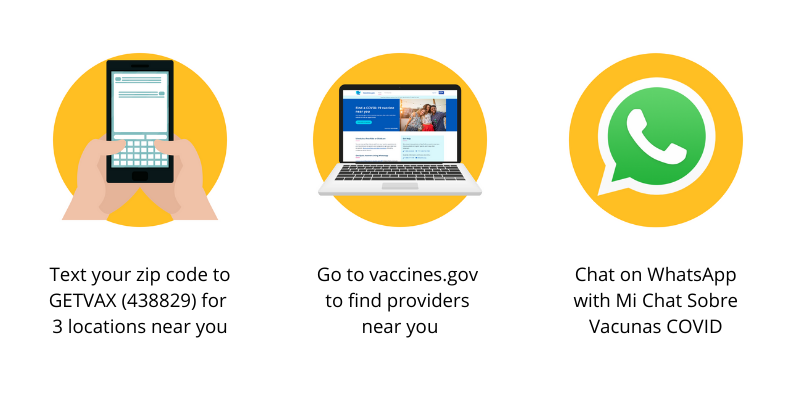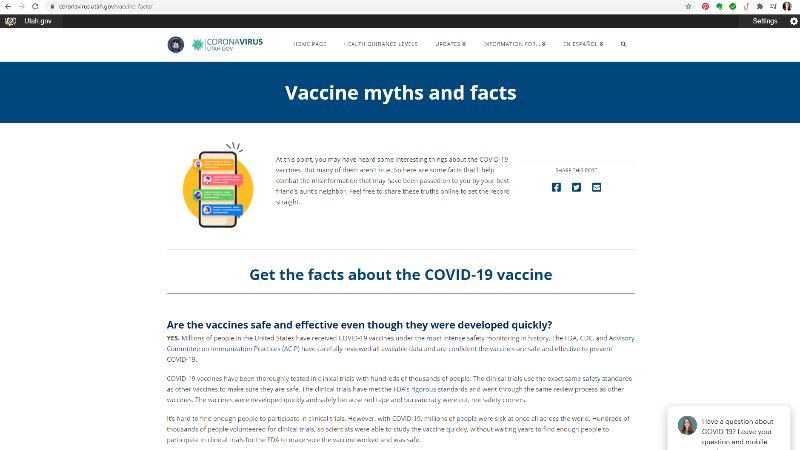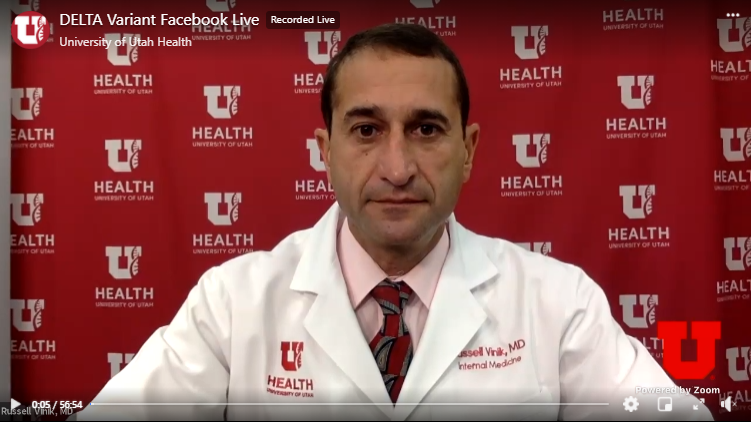
Last week, the University of Utah School of Medicine hosted a Facebook Live about the Delta variant of COVID-19. The Delta variant is more contagious and more severe than other strains of the virus. It’s easier to spread to other people.
Just like other viruses, COVID-19 changes constantly. A variant of COVID-19 has mutations that make it different from other variants. There are multiple variants of COVID-19 in the United States. The Delta variant is concerning because it’s more transmissible, and it’s causing more illness than other variants.
The easiest way to protect yourself against variants is to get vaccinated, and to get both doses if you’re getting the Pfizer or Moderna vaccine. Preliminary data shows natural immunity isn’t effective against the Delta variant. But the good news is, the mRNA vaccines like Pfizer and Moderna are effective. More studies are being done to see how the Johnson & Johnson vaccine works against this variant.* Long story short, get vaccinated. And if you’re not fully vaccinated, keep wearing a mask and taking precautions to avoid exposure to COVID-19.
“It’s important to understand that if you choose not to get vaccinated, ultimately, there’s a very high likelihood you’ll become infected.” Stephen Goldstein, postdoctoral researcher at the University of Utah School of Medicine.
Read more in the Deseret News.
* Learn about breakthrough cases of COVID-19 in people who are fully vaccinated
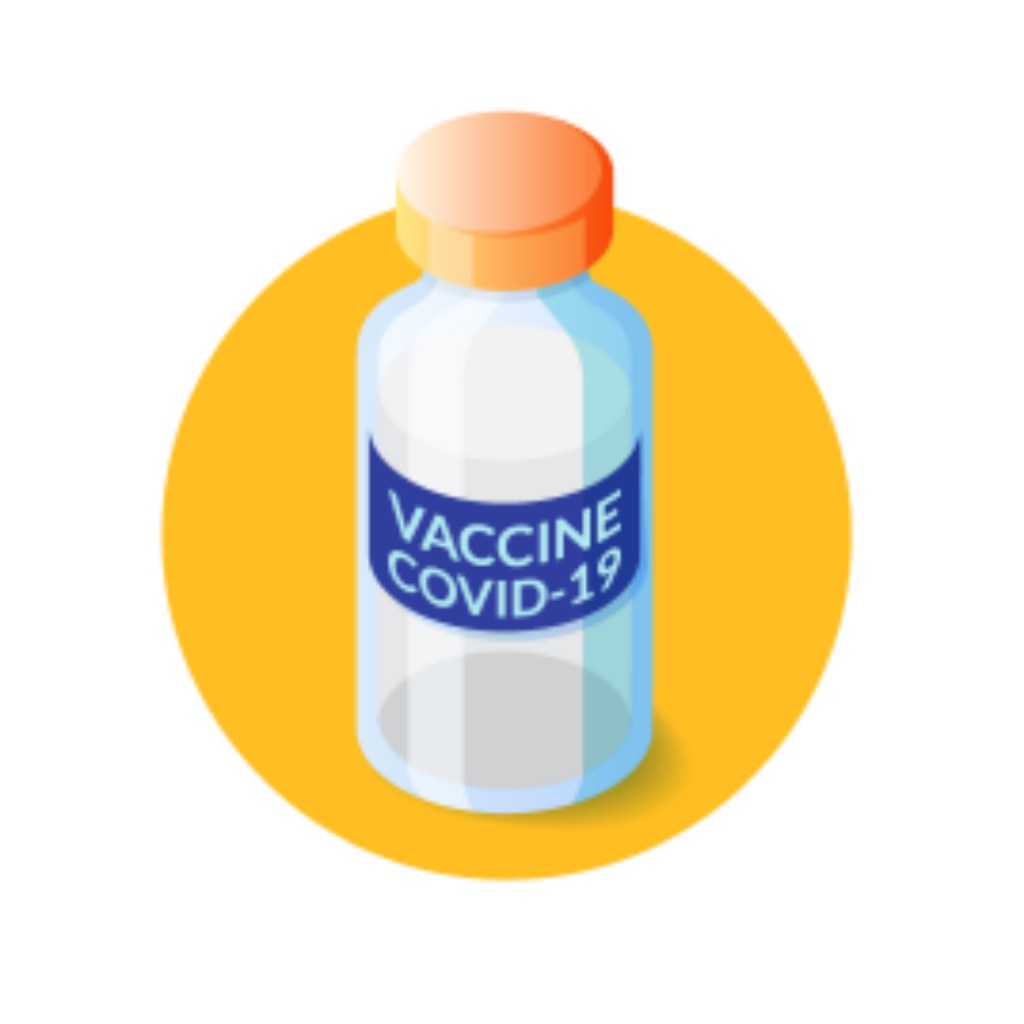
I need a booster dose if the Delta variant is so contagious?
Right now, the CDC doesn’t recommend booster doses. There’s also no recommendations about whether you need a booster dose of a different type of vaccine. For example, if you got the Johnson & Johnson vaccine, there’s no need right now to get a dose of a mRNA vaccine.
All authorized COVID-19 vaccines are effective against the variants we’ve identified so far. The level of effectiveness may vary based on a person’s medical history, age, and the type of vaccine they got.
The most important thing you can do to protect yourself and your family is to get vaccinated.
Young men, heart inflammation, and the COVID-19 vaccine
Last Wednesday, the CDC’s Advisory Committee on Immunization Practices (ACIP) met to discuss myocarditis and pericarditis in young adults who’ve been vaccinated. Myocarditis is inflammation of the heart.
The ACIP found that reports of myocarditis and pericarditis were most common in males after the 2nd dose of the vaccine. Scientists believe there is likely a link to the mRNA vaccines, since the rates of myocarditis are higher than expected. That said, the side effect is rare: 0.000095%, or 12.6 per million 2nd doses for young males. So far, most patients had only mild symptoms and responded well to treatment or recovered on their own.
CDC determined that the benefits of COVID-19 vaccination strongly outweigh the risks. And the nation’s leading doctors, nurses, and public health leaders stress the importance of young people getting vaccinated. Why?
- Teens and young adults have the highest rates of COVID-19 in the U.S. and new variants – like the Delta variant – mean there’s a much higher chance people who haven’t been vaccinated yet will get COVID-19 than ever before.
- Young people and people who haven’t been vaccinated yet face serious health problems from COVID-19 including long COVID and MIS-C (Multiple System Inflammatory Syndrome in Children). Far more young people have suffered from these health problems than those who have gotten myocarditis after vaccination.
- Myocarditis is much more common AFTER getting infected with the virus that causes COVID than after vaccination and the risks to the heart from COVID-19 are much more severe. In fact, in a study of 1,597 student athletes with a recent SARS-CoV-2 infection, 2.3% had an abnormal heart MRI finding, and 0.31% had clinical symptoms of myocarditis. Both figures are many orders of magnitude higher than the estimated risk of myocarditis after an mRNA vaccine: 0.000095%.
COVID-19 vaccines are recommended for people 12 years and older. Government agencies and healthcare institutions will keep monitoring cases and long-term outcomes of myocarditis after mRNA vaccination.
Source: Jennifer Beam Dowd, PhD, DearPandemic.org
Dr. Beam Dowd also recommendsSTAT News summary of ACIP meeting, Full ACIP meeting slides, Prevalence of Clinical and Subclinical Myocarditis in Competitive Athletes With Recent SARS-CoV-2 Infection, Previous DP post on myocarditis
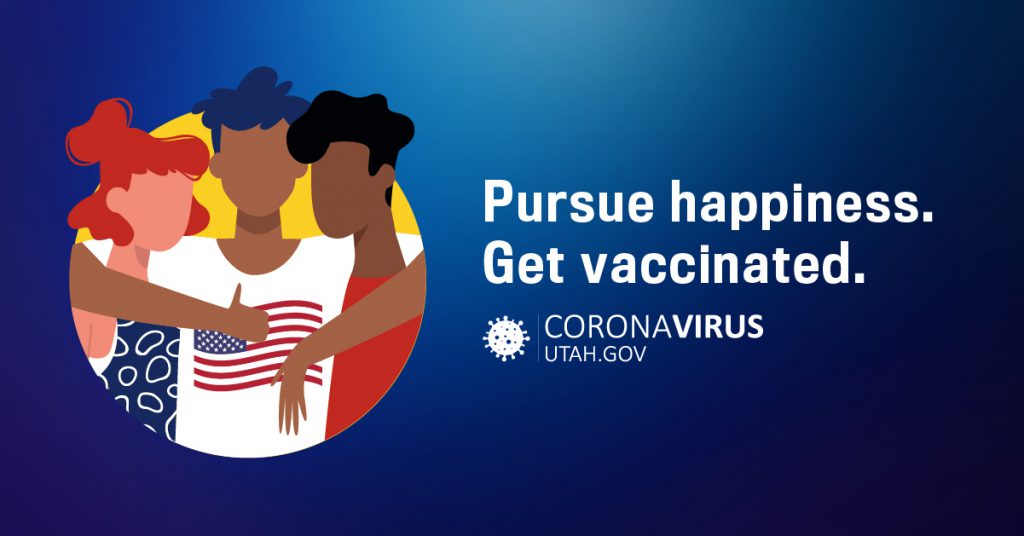
Encourage young adults to get the vaccine
Cases of COVID-19 in Utah went down in the spring, as many people were vaccinated. Now case rates are surging again. Cases and hospitalizations are highest among 25-44 year-olds, and in young people in general. (Fewer than 10% of cases are in Utahns older than 65, who have the highest vaccination rate). The vast majority of COVID-19 cases, hospitalizations, and deaths in Utah now are among people who are unvaccinated.
Meanwhile, it’s easier than ever to get the vaccine. Wait times are almost unheard of now. The number of locations where you can get a vaccine have increased. Vaccines are offered 7 days a week. Most vaccine providers and community events offer walk-ins and don’t require an appointment. Encourage the young adults in your life to get vaccinated.
